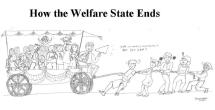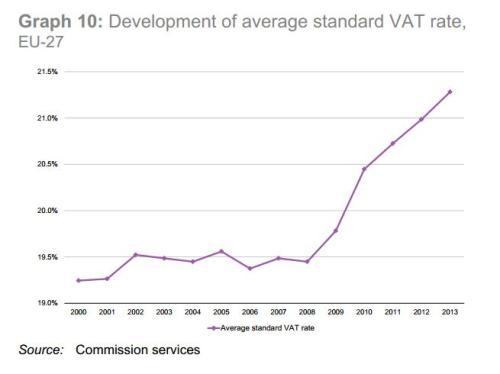I’m cited some remarkable examples of Orwellian language abuse.
- The World Bank published a study of national tax systems and countries with higher tax burdens were rewarded with a grade of “high effort.”
- A German bureaucrat accused a Czech politician of “obstructing the democratic process” for blocking a treaty, even though voters weren’t allowed to vote on the treaty in 26 out of 27 EU nations.
- American politicians, including President Obama, deliberately cause confusion by referring to tax provisions as being forms of government spending.
I prefer the honest approach. If you believe in bigger government and higher taxes, you should “man up” and openly express your views. Don’t dissemble, prevaricate, mislead, and obfuscate.
 The same is true, by the way, for advocates of individual freedom and smaller government. I’ve always admired Barry Goldwater, who famously wrote, “I have little interest in streamlining government or in making it more efficient, for I mean to reduce its size. I do not undertake to promote welfare, for I propose to extend freedom. My aim is not to pass laws, but to repeal them.” There’s no ambiguity in that statement!
The same is true, by the way, for advocates of individual freedom and smaller government. I’ve always admired Barry Goldwater, who famously wrote, “I have little interest in streamlining government or in making it more efficient, for I mean to reduce its size. I do not undertake to promote welfare, for I propose to extend freedom. My aim is not to pass laws, but to repeal them.” There’s no ambiguity in that statement!
Anyhow, we have a new entry in this contest for the most egregious use of Orwellian word games. And, not surprisingly, it’s by a statist.
Fred Hiatt, the editorial page editor of the Washington Post, wrote a column claiming that people are getting an entitlement if the government doesn’t double tax their retirement savings.
This spring Obama proposed a cap of about $3.4 million on how much people can save in their tax-advantaged IRAs and 401(k) plans… Obama isn’t keeping people from saving as much money as they can or want. The question is how much the rest of us should have to chip in. Obama is suggesting that at some point retirement accounts, invented to encourage working people to set aside enough for their sunset years, no longer need a helping hand from taxpayers. …The entitlement culture…runs deeper than the entitlement programs we normally think of, like Medicare and Social Security. …Now it’s the top one-thousandth demanding their right to tax breaks for socking away unlimited wealth in retirement plans.
There are several things about these excerpts that rub me the wrong way.
First, IRAs and 401(k)s are not “tax advantaged.” They’re tax neutral. These vehicles exist so that people don’t get double taxed on their savings. As I explained last year.
If you have a traditional IRA (or “front-ended” IRA), you get a deduction for any money you put in a retirement account, but then you pay tax on the money – including any earnings – when the money is withdrawn. If you have a Roth IRA (or “back-ended” IRA), you pay tax on your income in the year that it is earned, but if you put the money in a retirement account, there is no additional tax on withdrawals or the subsequent earnings. From an economic perspective, front-ended IRAs and back-ended IRAs generate the same result. Income that is saved and invested is treated the same as income that is immediately consumed.
But let’s set that aside. My main gripe with Hiatt’s column is that he wants us to think that people with IRAs and 401(k)s are getting “a helping hand from taxpayers” and that this is part of an “entitlement culture.”
This is statist nonsense. If somebody has an IRA and 401(k), they’re saving their own money. There’s no obligation being imposed on me or any other taxpayer.
But Hiatt presumably thinks that the government’s decision not to impose double taxation is somehow akin to a giveaway. But that only makes sense if you assume that government has a preemptive claim to all private income.
And if you have that bizarre mindset, then I guess it makes sense that IRAs and 401(k)s are part of the “entitlement culture.”
In other words, Hiatt wants us the think that there’s no moral, ethical, or economic difference between giving person A $5,000 of other people’s money and person B being allowed to keep $5,000 of his or her own money.
 But if that’s true, why bother producing and subjecting yourself to stress when your reward is punitive tax rates? Why not participate in the easy side of the “entitlement culture” and simply take other people’s money?
But if that’s true, why bother producing and subjecting yourself to stress when your reward is punitive tax rates? Why not participate in the easy side of the “entitlement culture” and simply take other people’s money?
In the real world, of course, that leads to policies with ever-growing numbers of people choosing to ride in the wagon and fewer and fewer people pulling the wagon.

